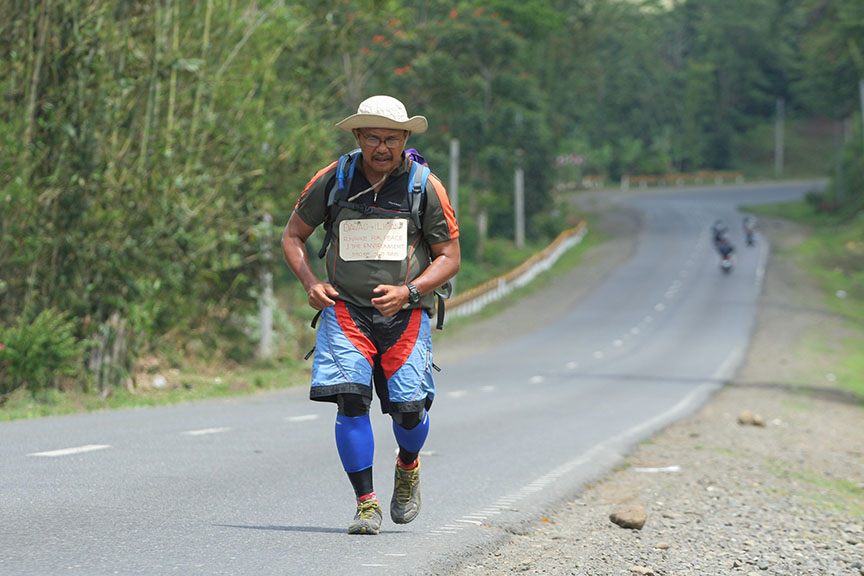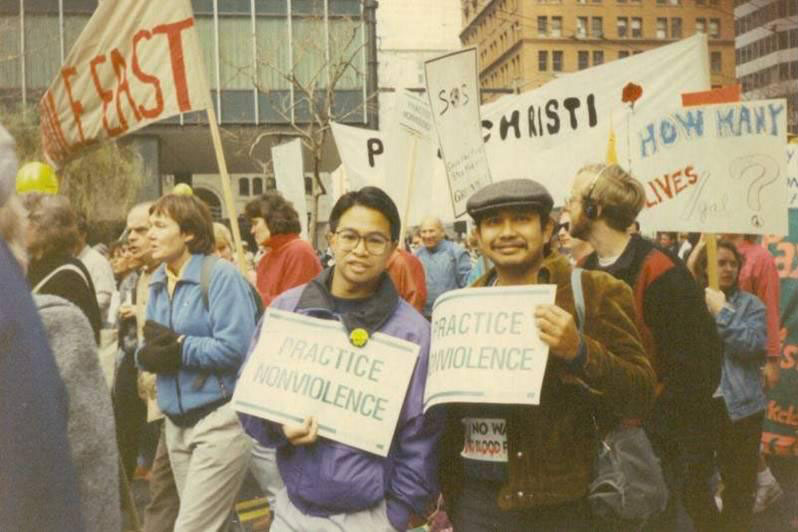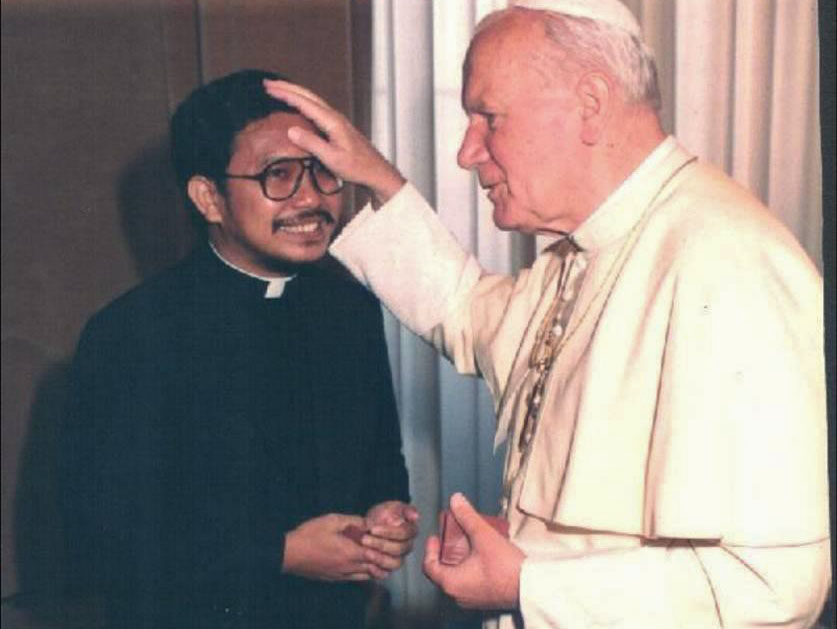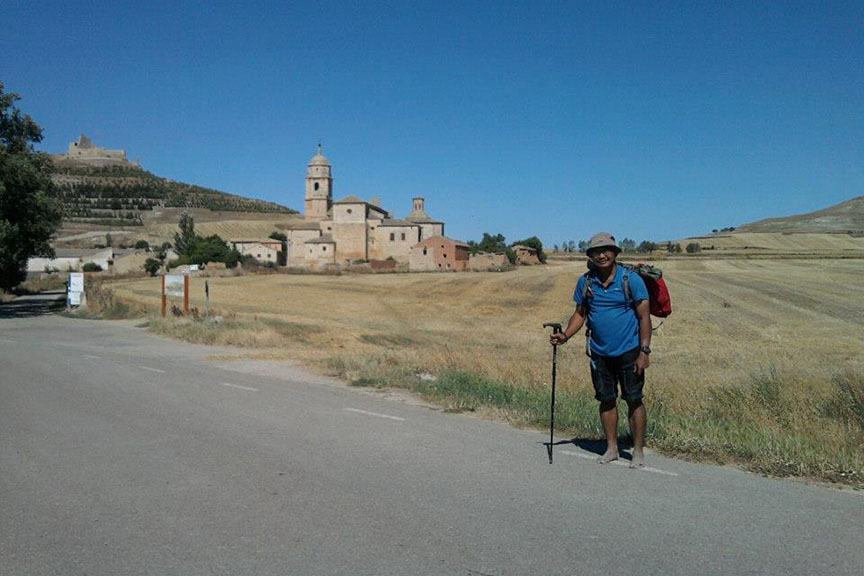
A Eulogy For My Brother, Fr. Amado “Picx” Picardal, CSsR
CEBU CITY (MindaNews / 29 May)—As a Redemptorist missionary, Fr. Amado Picardal, CSsR, better known to his confreres, family and friends as Fr. Picx, walked a thousand kilometers across the isolated villages in various parts of Mindanao. Hiking through mountain trails, walking across rice- and cornfields and crossing rivers, no place was far enough for Fr. Picx to reach.

However, he also walked to keep fit as well as to explore the world. He walked up and down Mt. Apo a few times. He had walked across Mindanao and the whole Philippines. He walked across Rome and then from the French Pyrenees across the North of Spain for his pilgrimage of the Camino de Santiago, not just once but twice. He was also a marathoner as well as a long-distance biker.
Today, Wednesday, May 29, 2024, Fr. Picx’ walking abruptly stopped. He collapsed in the garden near the hermitage that he had been building for a year in the hills of Busay where we have a small retreat center. He died of natural causes. In the past few years, he had high blood pressure, diabetes and a heart ailment. Today, was the 47th anniversary of his profession, since he got professed as a CSsR on this day in 1977. Many of us did not get the chance to greet him Happy Anniversary today!

I was about to take my siesta, when one of our caregivers, Carmel, entered my room to sadly announce his sudden death. He had died barely an hour earlier. At first I was not sure what I was hearing; but once I realized that Fr. Picx had passed away, I was taken aback and jolted out of my sleepy state. This is always the case with a sudden death of a loved one; one is just so shocked that one becomes speechless. Then the grief starts to seep in as one is confronted with the heartbreaking news!
The last time I saw him was yesterday at the dining hall but it was one of those casual encounters. I barely said – Hi Picx! and he also greeted me. (It might as well have been – Bye Picx!) There was no hint that very soon, he would die. As in similar circumstances when you last met a loved one who died suddenly, you could only utter the words: If only I knew then! Indeed, if only I knew then, I would have sat down with him, drank coffee and have one of those conversations like we’ve had through the years!
Born on October 6, 1954, he turned 69 years old last year. After high school, he joined the Redemptorists and took up AB Philosophy at the University of San Carlos in Cebu from 1971 to 1975 and was involved in student activism. He got arrested, tortured and imprisoned for seven months a year after Ferdinand Marcos declared Martial Law in 1972.
After college, he underwent the postulancy and novitiate phases of his formation and got professed in 1977. Four years later he was ordained to the priesthood on April 24, 1981 after finishing his theological studies at the St. Francis Regional Major Seminary (REMASE) in Davao City. As I was frequenting the Redemptorist monastery at this time, this was where I first met Fr. Picx. Meanwhile, I had joined the congregation in 1985.
For the next eight years, he was a member of the Redemptorist mission team – which was composed of Redemptorist priests and brothers and also lay missionaries (later the team was renamed Redemptorist Itinerant Mission Team). After my own profession, I got assigned to RMT (with Picx, then Fr. Emmanuel Cabajar who is now Bishop Emeritus and Bro. James Villahermosa). With seven lay missionaries, we had our mission in San Fernando, Bukidnon.
We helped form and strengthen Basic Ecclesial Communities in this parish. At the same time, owing to the crisis of water supply to irrigate the rice fields because of the logging operations in the area, we helped organize and mobilize the communities against the logging companies in 1987-1988. As a result of our efforts, the government cancelled the licenses of the two logging firms and imposed a total log ban in the province since 1989.

It was during our mission in San Fernando that I got to know Fr. Picx well. Upon returning to the parish convent in the poblacion once a month from our respective village assignments, I shared a room with him and we had interesting conversations. What struck me in those evenings was that he usually did not sleep very soundly, there were times I heard his teeth grinding. We were still under heavy stress in those months owing to the anti-logging operations which could have affected his sleep. I gave him a feedback about this and he did say that he took things far too seriously.
Clearly, he took his missionary vocation very seriously. He lived up to the challenges of a highly committed Redemptorist, ready to take on any tasks no matter how difficult. In his spare time, he wrote poetry and shared these with me. I found them quite impressive, so I took the initiative to collate them together into a publication and published a few copies. We even had a launch of this booklet at the parish hall. He also played a number of musical instruments, including guitar, harmonica and the piano.
A major need arose for the Redemptorists’ theology formation program in 1987. We no longer could enroll our students at REMASE, so we were forced to open our own theological institute, the St. Alphonsus Theologate (SAT) in Davao City (later renamed St. Alphonsus Theological and Mission Institute or SATMI). Some of us needed to be mobilized to be part of the administrative staff and faculty. Fr. Picx was sent for higher studies at the Jesuit School of Theology in Berkeley, California, USA in 1990-91 where he finished his licentiate in theology.
I was able to visit him there. During my short visit, he was asked to say the Mass for the St. Michael fiesta celebration of those from Iligan who had settled in the Bay area. Given a generous stipend, he was able to buy two tickets for Les Miserables, which was being performed in a downtown theatre. Even as this was already after the Marcos martial law regime, we still wept tears at the end of the musical play being reminded of the continuing poverty and oppression in our own country!
He then proceeded to Rome to continue his studies at the Pontifical Gregorian University. In 1995, he earned his doctorate in theology (magna cum laude); his dissertation was entitled “An Ecclesiological Perspective of the Basic Ecclesial Communities in the Philippines.” After this he returned to Davao to be the Dean of SAT, teach a few subjects and mentor the students writing their synthesis papers.

He had published a few articles earlier in a few journals. Eventually he wrote a few books, two of which were entitled Journey Towards A New Way Of Being Church: BECs In The Philippines and A Vision Of A Church Renewed (Living The Ecclesiology Of Vatican Ii And Pcp Ii). For the latter, I wrote the Foreword.
This was an excerpt of this Foreword: “Towards the end of this book, the author contends, ‘The pre-Vatican II model of the Church appears to still persist in the minds of many… There is still a gap between the vision and reality. There are still some dioceses and parishes where Vatican II and PCP II’s vision of the renewed Church has not yet been fully implemented. Vatican II seems to be ancient history for the new generation, and the documents remain unread, gathering dust in the libraries.’”
While assigned with SAT in Davao, Fr. Picx began to hear of Mayor Rodrigo Duterte’s drug war that had led to extra-judicial killings (EJKs) of drug sellers and users. Duterte first came to prominence as OIC Vice Mayor after Mrs. Aquino became President. Then he ran for mayor and won for three terms, from 1988-1998, then 2001-2010 and finally from 2013-2016.
Duterte promised to rid the city of criminal elements and end drug addiction in order “to make sure the city is safe and secured,” and thus attract investments. Provided a lot of support by the citizenry, there were no major impediments to his brutal tactics. Dissent and protests among civil society organizations – including human rights groups – in the city had weakened, so there was very little opposition to the EJKS. Thus for 22 years as mayor, he made the police force the main agents of the city’s killing fields. He himself had boasted that “more than 1,700 deaths” took place.
Collaborating with the few brave souls involved in human-rights campaigns, Fr. Picx became part of the small group that started documenting the cases. Eventually more than 1,000 cases were documented. He also spoke courageously at our parish church’s pulpit to denounce the EJKs. Naturally, he drew the attention of Mayor Duterte and his henchmen. Before long, word was that he was being “watched.”
In the meantime, during his break, Fr. Picx found the time and energy to walk, run a marathon and engage in long-distance biking. In 2009, he made a marathon comeback after a layoff of 14 years. He ran/walked across Mindanao during the Holy Week 2010, covering almost 400 km in nine days. In July-August 2010, he ran/walked barefoot on the Camino de Santiago covering around 800 km in 27 days.

In April to May 2011, he ran/walked across the Philippines covering 2,060 km in 57 days. On December 2014, he did a bicycle ride from Manila to Tacloban, Davao, Cagayan and Iligan in 14 days covering over 1,800 km. He became known as either the running or biking priest who did it for a cause! He had written a book about these expeditions and we considered it for publication. However, he thought to only have a few copies for our Archives.
In 2012-2013, Fr. Picx was appointed Executive Secretary of the Basic Ecclesial Communities (BEC) Commission under the Catholic Bishops Conference of the Philippines (CBCP). He was part of the national BEC Team with Bishop George Rimando (Chair), Msgr. Manny Gabriel, Msgr. Joemarie Delgado and Dr. Estela Padilla. He went around the country giving talks on BEC, facilitating BEC national assemblies and giving reports to the CBCP. He also wrote for the CBCP news.
With an upsurge of grassroots support, Mayor Duterte announced his candidacy for the Presidency of the Republic in early 2016. The mass support came from his promise that like in Davao City, he would work for the peace and order of the whole country, to put an end to the rising criminality and the end of corruption in government. On May 9 of that year, elections were held and he won. Consequently, his inauguration as the 16th president of the Philippines took place on Thursday, June 30, 2016.
As soon as he took full control, there was immediately an early sign that his would be an authoritarian government in place. First major business was to deal with drug addiction. And true enough, what he began in Davao City spread to the rest of the country, especially in Metro Manila. And days later, there appeared news reports regarding EJK cases. Again, civil society organizations and media seemed unable to raise strong protests that would impact government policy to end the EJKs.
However, the human rights groups eventually managed to file this case against President Duterte with the International Criminal Court (ICC) and on January 26, 2023, the pre-trial chamber of the ICC authorized the court’s procedure to do an investigation covering crimes committed between November 2011 to June 2016, including extrajudicial killings in Davao City while former President Rodrigo Duterte was its mayor as well as in other parts the country during his presidency up until March 16, 2019, a day before the Philippines’ withdrawal from the ICC’s founding treaty.
As of this writing, the investigation is continuing, despite the government’s refusal to cooperate, which means the investigators cannot enter the country.
Fr. Picx got embroiled in the brouhaha that erupted over the ICC development. Not long after, there were death threats. At first he and our superiors ignored these; however, as his security became a serious concern, he needed to leave the country. He got posted for a while in Rome taking on the job as head of the congregation’s Justice and Peace office. He also went to Brazil for a while and conducted retreats in the US.
Missing home and having had enough of a stay in foreign land, Fr. Picx quietly returned to Cebu. He thought it would be safe already to come home early this year. Besides, he had wanted to really begin his life as a hermit, and he planned to build a hermitage in our little property up in the hills of Busay, in the suburbs of Cebu City.
For a while, he and his confreres thought it was safe for him to live alone in the isolated place of Busay, until there were signs that he was being tailed by suspected assassins, always riding on motorcycle and wearing helmets and masks. For his safety, he retreated to our monastery. Still there were reports of suspected men parking their motorcycle in front or at the back of our monastery. Security around Fr. Picx had to be tightened.
We lived together for a few months and I pitied him. He was always a person who lived in the outdoors and staying in his room in the monastery was like keeping him in prison. One could tell there were times he felt depressed. When he thought it was safe for him to go back to Busay, he asked permission to return. However, he was still not allowed by the community since we were still not sure if it was safe for him. One could tell he felt restless and was really looking forward to returning to Busay to finish building his hermitage.
The risks lessened in the past few months, so finally he was allowed to return to Busay. During these months, he got really excited that the hermitage was about to be finished. In one of our gatherings, he announced by mid- to the end of June, we will all be invited for the blessing of this hermitage that is constructed on top of a promontory on a hill overlooking the cities of Cebu and Lapu-lapu and the seas that surround them.
It is not to be. Fr. Picx has gone to heaven instead. But all his life, he walked in the footsteps of the Redeemer!
(MindaViews is the opinion section of MindaNews. Redemptorist Brother Karl Gaspar is Mindanao’s most prolific book author. Gaspar is also a Datu Bago 2018 awardee, the highest honor the Davao City government bestows on its constituents. He is presently based in Cebu City.)
